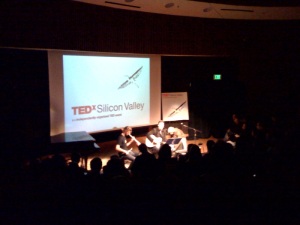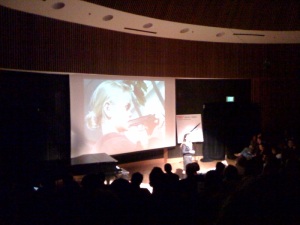My notes on ideas that struck me at TEDxSV
Featured videos:
- Jay Walker http://www.ted.com/talks/jay_walker_on_the_world_s_english_mania.html
- Aimee Mullins http://www.ted.com/talks/aimee_mullins_prosthetic_aesthetics.html
- Cryptozoo http://cryptozoo.ning.com/
Featured speakers:
- "Today is the day"
- "We are the search engine to our solution"
Reid Hoffman
- "public intellectuals help us reflect on who we are and who we should be as individuals and as a society"
- concept: "cause-based movements/companies"
- 3 things to look for in startups: "scalability, margins, defensibility"
- "web 1.0 was about going online to this different place [AOL chatroom] where weird behavior happens, web 2.0 is about real identities"
- "internet: cheap, scalable infrastructure to reach millions of people"
- "we use the same language to talk about cause-based movements as the internet: building 'networks', 'marketplaces', etc."
- "the fastest growing internet corporations are 'pure plays' -- entirely online. It's harder to get people to actually change what they're going to do on a Saturday afternoon. But as people get more familiar with being in a network, being in a marketplace, that [behavior change] will become easier. And it will be sustainable because the low-cost, scalable infrastructure of the Internet helps [reinforce] that behavior."
- concept: "large scale group coordination & distributed effort"
- quote: "the future is sooner and stranger than you think"
- concept: "collective problem identification, crowd-sourced ideation"
Leila Janah, Samasource
- "here in the US, it's easy to think that we live in a meritocracy"
- "well meaning outsiders have created a culture of handouts [in Ghana]"
- "we are witnessing a tremendous surge in human capacity -- global literacy on the rise & 90% decrease in cost to get online."
- "digital microwork: crowd-sourced labor, small tasks worth a few cents each. this is the future of work."
- "future is about humans and computers working together to get stuff done"
- "people don't need charity, they need a decent way to make a living"
Drue Kataoka
- "building social bridges with art"
- "bridges: art & science, culture & technology"
- concept: "negative space: the space between brush strokes, it's what's NOT there. it's inherently participatory and collaborative. it's where imagination can play."
- "social entrepreneurship is about building bridges. art is uniquely empowered to build those bridges."
Clayborne Carson
- concept: tension of top-down vs. bottom-up organization in social change... MLK = top-down, prophetic visionary, difficult to emulate. Bob Moses = bottom-up organizer, empowering individuals
- "organizer: building self-reliant, grassroots leaders."
- "organizer: our job is to work ourselves out of a job"
- "skilled organizing can create an enormous amount of energy from poor people with small resources"
- "our movement may have still happened without King, but it would have been a very different kind of movement"
- "good organizing, good teaching sets free the best qualities of those who have never been allowed to shine"
Eoin Harrington

Peter Hirschberg & Josette Melchor
- "the meeting place of art & technology"
- "photography -- the quintessential meeting of art and technology -- initially dissed by French literacy establishment"
- "impressionism -- the new 'platform' or 'ecosystem' of its day -- also panned on first reviews"
- new art doesn't fit labels, categories, critics can't write about, people don't understand, it gets shunned
- "what's been bubbling up in the silicon valley technology community is now spilling over into the art community"
- http://www.gaffta.org/
Nancy Lublin
- [Emperor's March from Star Wars] "Do you think of Darth Vader? Luke? I think of the Stormtroopers! They really made things work."
- "We are obsessed with leadership. Google 'CEO' and you get 4MM hits. Google 'COO' and you get far fewer..."
- "We are obsessed with 'new', perhaps at the expense of 'impact' -- we don't need another new cancer oragnization, we need the 300 existing ones to work better together."
- "You have permission to JOIN something [instead of 'founding']. Permission to make IMPACT. Permission to coin a new title: 'DO-er'"
Di-Ann Eisnor
- "On the CNN map, borders look solid, permanent -- between us and them. Up close, borders are fluid; they're social."
- "Less than 10% of us cross borders for tourism. [Correlation to tourist dollars.] 10% of countries take 70% of tourist receipts."
- "273 cross-border groundwater aquifers -- governments need to manage these with each other. higher potential for conflict."
- thought-provoking: "Who in this room spends time with their friends in East Palo Alto? The borders that we draw in Silicon Valley have just as much impact as the ones in Gaza."
Yvonne Lee Schultz
- what happens when you turn guns into chocolate?

Alberto Vollmer - CEO of leading Venezuelan rum distillery & bottler
- Project Alcatraz - criminal re-insertion into employment
- [opposing violent criminal gangs in Venezuela] "We have to retaliate, but it has to be creative; it can't be violent."
- [presenting a recruiting pitch in middle of gang-dominated slum] "I came here to make you dream. Let's talk about what kind of TV you're going to have, what do you want for your kids, what kind of restaurants will be here."
- quote: "hope is so much more powerful than fear, it will always win"
Victor Tsaran - advocate for the blind, musician, Yahoo accessibility lead
- "Transformation through technology. Using technology to overcome perceptions of what is possible."
- quote: "Life is upbeat, rhythmic, and full of surprises"
- "We create technology to make life meaningful. With technology, we can do certain things that we could not without technology."
YouthSpeaks
- [teens in Bosnia were tired of foreign journalists coming in to steal their stories] "They wanted to tell their own stories, in their own voices"
- "The #1 fear in this country is public speaking, more than death"
Peter Thiel
- Poll: which disaster is most likely?
- * robots kill/enslave humans
- * biotech-driven pandemic
- * runaway nanotech gray goo
- * nuclear war
- * governments use computers to control everyone
- * runaway global warming
- * singularity takes too long to happen <== Peter's worried about this
- "our entire civilization is predicated on accelerating technological change"
- "example: retirement planning is based on assumption of 8.5% annual return on investments. that assumption is based on last 100 years of economic data. problem: last 100 years have been a time of incredible accelerating technological improvement. if you ran that same analysis on 1200-1300 A.D. or the last 100 years of the Roman Empire, you'd be lucky to get 0% return, just to keep your money. Trouble is that the pace of technological progress seems to be slowing..."
- "people seem to be working harder, running really hard just to stay in place."
- "when people talk about progress in the developing world -- China, India -- it's always a 20 year story. Life there will be so much better in the next 20 years because they'll get all the things that the developed world has now. But when we talk about progress in the developed countries, it's always on 6 month time scale. Is the recession over? What's the market going to be like in 6 months? Why do we not talk about how life will be dramatically better in the developed world in 20 years?"
- "of 538 congress people, 11 have degrees in engineering. they all think that 'science and technology are solved by other people.' but if everyone thinks that, then that's a problem."
Thomas Goetz, ex-Wired editor, Public Health MA
- "Life is an experiment. How can we turn this into more of a controlled experiment?"
- Health information is dumped on us, scattered, disconnected. Not effective. Health problems are increasing in US.
- "Hawthorne effect -- when people know they are being observed, they changed behavior. Usually experimenters want to get rid of the Hawthorne effect. But Kansas City orthodontist experiment shows that we can use Hawthorne effect to drive behavior change [brushing teeth more with 'experimental' toothpaste]. Also applies to weight loss [e.g., taking daily photo of your weight on scale]."
- "Whitehall experiment -- controlling for diet and habits, people of high social standing were 2X less likely to die of heart disease than those of low social standing. Why? Control. People at top of social ladder have more control over their lives than those at the bottom."
- "Feedback and Groups are effective, powerful driver of behavior change."
- "Need a control tool: an algorithm, a decision tree that anyone can follow."
- "We want tools and techniques that have minimal friction and scale."
- "Data means more when it's our own."
- "The more we mind our health, the better we are."
- "Don't just make people responsible, but give them the tools and data to make behavioral change."
David de Rothschild - explorer, both poles
- "When people ask about expeditions, the question that has stuck with me: 'How was it out there?' What does that mean, 'out there'?"
- "Kids are learning about nature, but they're not out there, in it."
- "Nature Defiancy Disorder"
- "We view nature as chaotic, intimidating. But we like to think things in a linear fashion, things have a start and an end."
- "We are starting to manufacture nature at the expense of nature itself."
- "GDP is a deception -- we treat the cost on nature as an externality. It's like kid who puts up a lemonade stand, says they made $20 when the lemons, the jug, the sugar, all the materials were paid for by his mom."
- "when you undertake a dream it becomes an adventure. adventures create stories. humanity is based on stories. stories become the inspiration for more dreams." [sidenote: that's a viral loop]
- "humanity always wants to take the path of least resistance. curiousity and innovation may lead you down a different path, NOT the path of least resistance."
- "you never change something by fighting existing reality. you change things by building a new model that makes the existing model obsolete." [Buckminster Fuller quote]
Andrew Hessel - "the end of cancer" & PinkArmy.org
- "computer systems are analogy for biological systems. insight: you can look at humans as a network of trillions of computers."
- "computers and networks break in ways that are similar to biological systems."
- "DNA is genetic instructions, biological software."
- "We generated so much data, information about genetics & cancer through research. we generate lots of research, we pay a lot of researchers. but fundamentally, we need to realize that research does not make therapies. Who makes therapies? Developers."
- "we're spending more and more on research, while getting fewer and fewer and therapies actually produced."
- "research is exponential [more and more every year], development is linear [can't keep up, obsolete before it's even delivered]"
- "how about focus on the very end of the long tail? one therapy for one person: YOU"
- "build viruses based on your own DNA, that attack one particular type of cancer in your own body while leaving the rest of your cells alone."
- "co-operative business model - the first drug company for people that don't need to make a profit"